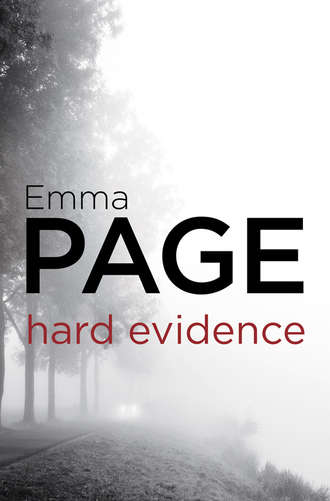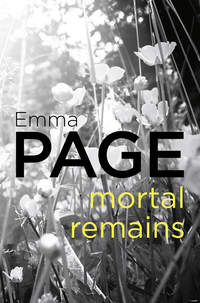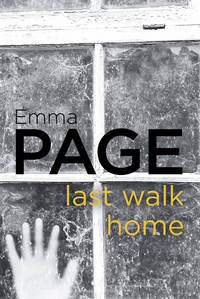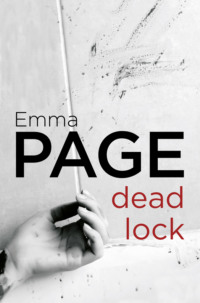
Полная версия
Hard Evidence
Iris approached with the food and Marchant took a couple of paces back. He stood watching for a moment as she deftly served it, then he inclined his head again and resumed his circuit of the room.
The food was as delicious as Iris had promised. Julie chatted in an entertaining fashion, scarcely ever, Lambert noticed, saying anything very personal about herself. He managed to gather that she was living on the outskirts of Millbourne, she had a job in the town, and that was about all. He asked about her job but she made a face, implying it was of little interest. ‘Is it so dull?’ he pursued. But she would only say: ‘It’s certainly not what anyone could call exciting. I’ll be back at work on Monday morning. I’d just as soon forget the job till then.’ He asked no more personal questions.
When Iris brought the coffee Julie said to her: ‘I wouldn’t at all mind coming back here for a longer break, say a week or two, quite soon. Do you think that would be possible?’
‘I think you’d be all right,’ Iris told her. ‘It’s still pretty early in the season. It would be a different story if it was July or August. And two of the residents are leaving soon. Miss Hammond’s off to her cottage in the next week or two and Mrs Passmore’s going to join an old friend who’s been widowed – they’re going to try sharing her house together, to see if it works out. I should think it would, Mrs Passmore’s easy to get along with.’
She caught Lambert’s quick glance at the nearby table where Mrs Passmore sat over her coffee and liqueur, selecting a chocolate from an expensive-looking box in front of her. ‘You needn’t worry,’ Iris assured him. ‘She won’t hear us talking about her. She’s pretty deaf, though she’d never admit it. You have to face her straight on and talk quite loudly if you want her to hear. She’ll have to come round to wearing a hearing aid sooner or later but she’s putting it off as long as possible.’ She grinned. ‘You’d think folk would have got beyond vanity at her age but it seems they don’t. Take that hair of hers. Looks well, doesn’t it? That’s a wig. Funnily enough, she doesn’t make any secret of that. Wigs are quite a hobby of hers, she has half a dozen in different styles and colours, they cost a fortune.’ She turned to go. ‘Yes, I’m sure you’ll be all right,’ she added to Julie. ‘Give them a ring as soon as you’ve settled on a date. I’m sure they’ll be able to fit you in.’
As they were finishing their coffee Lambert saw Miss Hammond push back her chair and walk across to Mrs Passmore’s table. Mrs Passmore looked up at her, watching her lips; Miss Hammond spoke slowly and clearly. ‘I’m going over to the cottage this afternoon; I’m leaving in a few minutes. I wondered if you’d like to come with me and take a look round, see what you think of it. I’m sure you’d find it interesting and you may have some ideas about improvements.’ Her voice took on a cajoling tone. ‘It’s a beautiful afternoon. I’ll be sure to bring you back here in time for tea.’
‘It’s very kind of you, Olive.’ Mrs Passmore’s voice already held a refusal and Miss Hammond’s face drooped. ‘But I’m playing bridge this afternoon, I’m being collected at half past two.’ She didn’t offer Miss Hammond a chocolate. ‘Some other time, perhaps,’ she added in a tone that didn’t promise much. She picked up her coffee cup and drank from it in a manner that spoke unmistakably of dismissal.
Miss Hammond gave a resigned nod. She wore a faintly dejected look as she left the dining room. ‘Poor dear,’ Julie said lightly. ‘She didn’t even get to show Mrs Passmore her new shoes.’
Lambert looked at his watch. ‘Time I was moving.’ As they came out into the hall he said, ‘I enjoyed our lunch. I hope you have a pleasant weekend.’
Julie smiled. ‘It was very kind of you to help me with the car.’ She slid him a beseeching little look, open, unguarded. ‘Will I be seeing you again?’
For a moment he was tempted; for a moment he felt himself a green lad again, her own age. But common sense at once brushed aside the thought. Whatever he was currently in the market for, it very definitely wasn’t for naive, immature young girls, however winning their ways, however pretty their clouds of hair.
By way of reply he made a noncommittal sound. He consulted his watch again with deliberate openness and gave her an impersonal smile that very distinctly said goodbye.
Her beseeching look fell away. She smiled brightly back at him, raised a hand in a departing wave and turned to go upstairs to her room.
She had got the message.
Lambert came down the hotel steps and set off for the car park. A short distance in front of him he saw the stocky, chalk-striped figure of Miss Olive Hammond, walking briskly in the same direction.
Miss Hammond’s car, a Volkswagen Beetle, was parked a few yards from his. ‘A glorious afternoon,’ she called across as he halted to fish in his pockets for his keys. She looked pleased to see him. ‘I’m making the most of this weather; I’m going to do some gardening at the cottage I’ve bought.’
She suddenly walked swiftly over to Lambert’s car and positioned herself strategically in front of the driver’s door. ‘I’m moving into the cottage very soon,’ she continued in a rush. ‘I’ve been going over there, making a start on the garden. It’s quite a wilderness, the place has been empty for years.’
Lambert had by now found his keys. He went up to his car but Miss Hammond showed no sign of budging. She went rattling on. ‘It’s an old cottage, Victorian. It was modernized – after a fashion – back in the year dot. A lot of people would be put off by the state it’s in but I know it will be very attractive when I’ve finished with it. I’m looking forward to it all tremendously. I’ve never owned a property before.’
‘I’ve never owned one at all,’ Lambert said.
‘I’m going to see about plans for an extension. Then there’ll be all the repairs and improvements, it’s going to be very exciting.’ She pulled a face. ‘You’d be astonished at how much it’s all going to cost. I know I was. It’s only when you actually get down to it that you realize what prices are these days.’
Lambert mustered his patience as best he could. ‘I dare say you can get it added on to your mortgage,’ he suggested.
She waved a dismissive hand. ‘Mortgages are not for me. I wouldn’t want to be saddled with one at my time of life. Cash on the nail, that’s the only thing at my age. I won’t be taking a holiday this year, I’m devoting all my time to the place.’ She jerked her head. ‘I’ve started going to salerooms and auctions. I’ve bought a few odds and ends, just the bare minimum to start with. I’ve got them in store, ready to move in. I want to get old furniture as far as I can – not real antiques, of course, they cost the earth, but you’d be surprised what nice little cottagey pieces you can still pick up cheap. I’ve been reading up about old houses, old furniture, the different styles and periods.’ She grinned. ‘They’re getting to know me at the public library.’
Lambert tossed his keys into the air and caught them again. Olive ignored the hint. ‘Are you fond of gardening?’ she asked.
He tossed the keys again. ‘I can take it or leave it.’
‘I’ve had a look round the garden centres and shops but the plants and shrubs cost a small fortune. But I’ve thought of a way of getting round that.’ She made a pleased little face. ‘I intend cadging cuttings and plants from Luke Marchant. I can slip him a few bob – much cheaper than buying them.’ She raised a cautionary finger. ‘Mum’s the word, of course. No need for His Nibs to know anything about it.’
Lambert’s patience came suddenly to an end. ‘I must be getting along,’ he told her brusquely.
Still she stood immovable. ‘I’m going to be all alone at the cottage after I move in. It’ll be quite a change, after living in a hotel for the last four years.’ She looked up at him. ‘It’s going to feel very strange.’
‘You should get yourself a pet. A dog. Or a cat. Very good company.’
She shook her head at once. ‘They’d take too much looking after.’
‘A bird, then.’
‘A bird,’ she echoed on a note of lively interest.
‘Get a budgie,’ he suggested. ‘Teach it to talk.’
She smiled. ‘I might just do that.’
He took a step forward. ‘If you wouldn’t mind.’ He gestured at the car door. ‘I really must be off.’
She moved reluctantly aside. As soon as he had got in and closed the door she stooped and rapped on the window. He wound it partway down. She seized hold of the top of the glass and stuck her face in at the opening. ‘You’ll have to come over and see the cottage. You and your young lady.’
Lambert switched on the engine. ‘She’s not my young lady. I just happened to come across her today. I won’t be seeing her again.’
‘Then come by yourself. Any time you’re in the neighbourhood, do call in. The cottage isn’t on the phone yet but no matter about that, you can just drop in, take me as you find me. I can give you a cup of tea – something stronger, if you like. I can always rustle you up a meal.’
‘Very kind of you.’ He managed a smile of sorts. ‘I’ll bear it in mind.’
She began to rattle out hasty directions for finding the cottage. He made to start winding the window up again and she was forced to withdraw. She was still calling after him as he pulled out without further ceremony. He was off and away, down the drive, out through the gates, heading for Cannonbridge.
All at once the day took on a totally different complexion. In no time at all he would find himself giving the chief inspector an account of his wasted morning. Not a prospect he relished.
Before he had put a couple of miles behind him all thought of Olive Hammond and her cottage had gone from his mind.
CHAPTER 4
The cuckoo had barely uttered his first hollow notes when the spring weather turned abruptly fickle, with gusts of rain, showers of sleet and hail, followed by a succession of grey, damp days, giving way all at once to another spell of cloudless skies and warm breezes. Horse chestnuts blossomed white and pink along the avenues, lilac and laburnum bloomed in suburban gardens, hanging baskets of lobelia and trailing geranium sprouted from lampposts; floral clocks appeared in municipal flowerbeds.
Bank holidays, agricultural shows, festivals and carnivals. Children danced round maypoles. Grown men dressed up as Cavaliers and Roundheads and fought pitched battles over stretches of harmless countryside. The cuckoo was in full voice.
In the DIY stores staff worked overtime. Gallons of paint, acres of wallpaper, were loaded into the boots of cars. Householders erected scaffolding and climbed up ladders.
Sergeant Lambert’s landlady was afflicted, as every year, by her own variety of spring fever. With her it took the form of prodigious exertions in the garden, a sustained attack upon the contents of cupboards and drawers: sorting, discarding, cramming into cardboard boxes to be piled outside the back door and borne off by the dustmen.
At the end of May a nasty virus made its stealthy appearance, insinuating its way into the country from abroad by means of the aeroplane, cutting a swathe through the population and certainly not minded to spare the main Cannonbridge police station.
Sergeant Lambert endured an attack of average ferocity but Detective Chief Inspector Kelsey was very unwell indeed. He struggled back to work earlier than he should, unable to endure any longer the tedium of an invalid existence alone in his flat – he had lived on his own since his divorce years ago.
He dragged himself up the station steps. A big, solidly built man with craggy features, green eyes normally bright and sharp but heavy now and lacklustre; a head of thick, carroty hair, devoid today of its usual shine and spring.
Outside the windows the season swept joyfully on but the Chief knew none of it, huddled glumly in his office, wheezing, reeking of liniment, sucking lozenges powerfully fragrant with menthol and eucalyptus.
One morning in the middle of June Sergeant Lambert ventured to suggest to the Chief that what he needed was a holiday. The sergeant was still not in top form himself. He had already booked his own holiday for September – he was going to Greece with friends – but he had a couple of weeks in hand. If the Chief decided to take himself off for a break, Lambert wouldn’t at all mind fixing himself some leave at the same time, very convenient all round. He could go and stay with his sister and her family in Sussex or with married friends in Wales.
The Chief didn’t bother to give him any kind of rational reply, he merely dismissed the notion with a shake of his head. He had so far made no plans for any leave; he was never attracted by the vision of long days of leisure; holidays always served to emphasize his aloneness.
A day or two went by and still the Chief felt no better. What I need is a really good, strong tonic, he decided. Something stronger than he could buy over the counter. He went reluctantly back to the doctor who came up with precisely the same remedy that Sergeant Lambert had proposed: ‘What you need is a holiday.’
The Chief shook his head stubbornly. ‘All I need is something to make me feel a bit livelier.’
But the doctor could be equally stubborn. ‘I am giving you something,’ he countered. ‘I’m giving you sound advice. Instructions, if that makes it any easier for you to swallow. Take a holiday. Now.’
As he closed the door behind him, Kelsey shook his head slowly and with determination. On his way back to the station he went into a health-food shop and bought himself a large bottle of a fiendishly expensive herbal elixir, brewed in the back yard of some monastery in the Balkans. The moment he got back into his car he took a long swig from the bottle. He immediately felt so hideously unwell that he knew beyond doubt it must be doing him good.
He said nothing of all this to Sergeant Lambert.
On June 21st the Chief awoke in a sourly irritable frame of mind. He felt no better. If he must be honest, he felt worse.
Sergeant Lambert greeted him at the office with a reminder that it was the first day of summer, a remark that did nothing to lift the Chief’s spirits. He tackled without enthusiasm the pile of mail awaiting him.
Before long he came upon a letter written in a slow, shaking hand. It was from a Mr Eardlow, with an address in a hamlet a few miles from Cannonbridge.
Eardlow apologized for writing instead of coming over to the police station in person, but his circumstances made a visit difficult. He and his wife were advanced in years and suffered from various health problems. They no longer owned a car and public transport in the area was very limited.
They were worried about a young relative. They had been trying to get in touch with her for some time but hadn’t been able to make any contact, nor, indeed, to discover her present whereabouts. They would be most grateful if an officer could call on them; they would supply him with full details.
Kelsey sighed and shook his head. Eardlow hadn’t even given the name of the missing relative. No doubt it was another case of an inconsiderate, harebrained youngster taking it into her head to abscond temporarily for the most trifling of reasons, sometimes for no reason at all, never giving a thought to the anxieties of family and friends.
He tossed the letter across to Sergeant Lambert. ‘Better get over there and have a word with these folk,’ he instructed. ‘I doubt if there’s anything in it.’
In the afternoon Sergeant Lambert drove over to the hamlet, having first phoned the Eardlows to fix a time. They were nervously awaiting him in the spotlessly clean parlour of their little cottage. The furniture gleamed, the brass shone. A table was set with an elaborate lace cloth and what were undoubtedly their best china cups.
Mrs Eardlow had the kettle already on and she brewed the tea right away. She moved slowly and with difficulty. Her husband walked with the aid of a stick, his hands were swollen and knobbed. In Lambert’s estimation neither of them would see eighty again. He felt a pang at the thought of all the painful domestic activity on the part of this frail old couple that must have taken place in the little dwelling after his phone call.
He didn’t ask questions to start with, he didn’t press them in any way. Over an excellent tea they began to relax. They stopped treating him as if he were minor visiting royalty and began to unload their worries.
The missing relative was a girl of twenty. As soon as they told him her name, Julie Dawson, bells began to ring in Lambert’s brain. By the time they added her address, Honeysuckle Cottage, near Millbourne, he was almost certain. He asked if he might see a photograph.
They couldn’t produce anything very recent but showed him some snapshots taken during Julie’s last visit two years ago. Lambert looked down at the pretty face, the impish smile, the beautiful hair.
‘I’ve met this girl,’ he told them. They looked startled. He gave them a brief sketch of his encounter with Julie by the roadside near Calcott House. After a burst of astonishment the Eardlows took up their story again.
It seemed that Julie was an only child, born late in her parents’ marriage. Her father – fifteen years older than her mother – had been a first cousin of Mrs Eardlow. Both Julie’s parents were now dead and the Eardlows were her only living relatives. Julie worked for the Millbourne Advertiser as a telephone sales clerk; she had been there three years.
During her first year in Millbourne she had visited the Eardlows two or three times. Two years ago she had moved into lodgings at Honeysuckle Cottage. Since then she had written a few lines occasionally and had sent cards at Christmas and on their birthdays, but she had never once visited them.
They had replied without fail to her letters and cards, giving her their bits of news, repeating the invitation to come for a visit, a weekend, or a longer holiday. They had always been fond of Julie, had always been on good terms with her and her parents. As far as they knew, Julie was happy in her job, had settled down well at Honeysuckle Cottage, liked her landlady, a Miss Audrey Tysoe.
The Eardlows had celebrated their golden wedding in the first week of June. Julie had long known about the planned gathering of friends. She had definitely told them she would be there. Not only would she attend the party but she would stay with them for a night or two. This had been settled months ago and had been referred to on both sides more than once since then.
‘We were very disappointed when she didn’t come.’ Mrs Eardlow looked on the verge of tears. ‘Very surprised, too. She didn’t even write or phone.’ They had thought at first that the date had somehow slipped her mind, but she would remember after a day or two and they would hear from her.
But the days went by and they didn’t hear. They began to wonder if she was ill, or had met with some accident. In the end Mrs Eardlow rang Honeysuckle Cottage, not without misgivings. The Eardlows came of a generation who had grown up without telephones. It was only in very recent years, since their health had grown frail, that they had had a phone installed. They regarded it as an instrument to be used in emergencies and with due respect for the cost of calls. Nor had they any wish to appear to be prying into Julie’s life.
It was the first time Mrs Eardlow had spoken to Miss Tysoe; she had found her pleasant enough. Miss Tysoe told her Julie wasn’t there, she hadn’t been there for some time, she was on indefinite leave from her job at the Advertiser. She had gone for a holiday to Calcott House in May. Miss Tysoe didn’t know her present whereabouts but she wasn’t anxious; she was confident Julie would turn up again when it suited her.
The Eardlows were at first reassured by this but after mulling it over for a day or two their uneasiness surfaced again. Why should Julie have decided to go on indefinite leave? Had there been difficulties at work? And what about the money side of it? How was she managing?
So they finally rang the Millbourne Advertiser and spoke to the proprietor, Mr Fielding. He told them Julie had not been in touch with the office since going on leave in May. She had given no reasons for wishing to take extended leave and she had not been pressed on the matter. She had always been a good worker and the Advertiser was happy to accommodate her in this instance. They were sure she would return when she had resolved whatever it was that had made her ask for leave. Her job would certainly be waiting for her; the Eardlows need have no worries on that score. Fielding had no idea of her present whereabouts.
Again, when the call was over, the Eardlows felt reassured to some extent, but again, after a day or two, their anxieties sprang up as strongly as ever.
This time they phoned Calcott House and spoke to Mrs Marchant. She told them Miss Dawson had stayed at the hotel from May 10th to May 16th. There had been no trouble or upset of any kind during her stay; she paid her bill on the day she left. The only address the hotel had any note of was her Millbourne address, Honeysuckle Cottage, but Mrs Marchant seemed to remember that Miss Dawson had said something on leaving about going to a caravan. No, Mrs Marchant had no idea where the caravan might be. She couldn’t even be certain she was correct in associating that remark with Miss Dawson; it could have been some other guest. No, the hotel had had no communication from Miss Dawson after she left; there had been no mail or phone calls for her since then. Nor had anyone come to the hotel asking to see her.
By now the Eardlows found themselves very far from reassured. They talked it over for another couple of days, arguing back and forth. Probably there was nothing at all amiss – but if it later turned out that there was, they would never forgive themselves if they had just let the matter go.
In the end they decided with a good deal of trepidation to write to the Cannonbridge police and leave it up to them to judge if any inquiries were necessary.
Lambert told them he would report back to his Chief. ‘I’ll let you know what’s decided,’ he added as he stood up to leave. ‘In the meantime, try not to worry. Young women can be very impulsive. Julie could turn up any day, astonished to hear you’ve been so anxious about her.’
‘I dare say you’re right,’ Eardlow agreed. ‘We’re not able to get about much these days, we do tend to sit and chew things over. I suppose we’re inclined to get things out of proportion.’
They thanked the sergeant profusely for coming over to see them. They insisted on going with him to the door, shaking his hand on the threshold. Mrs Eardlow looked up into Lambert’s face as he took her frail old fingers into his strong, warm clasp.
‘I’m still not happy in my mind,’ she told him earnestly. ‘Whatever kind of sudden notion Julie may have taken into her head, she’d never have forgotten our anniversary.’ She shook her head with feeble force. ‘Not Julie. Never in a million years.’
CHAPTER 5
Chief Inspector Kelsey was about to drag himself off to a conference for a few days and wasn’t looking forward to the prospect. He certainly wasn’t disposed to feel overmuch concern for Miss Julie Dawson. ‘Skittish young females,’ he said to Lambert on a note of trenchant censure. Over the years he had come across many of the ilk, light-minded creatures who woke up one bright morning and took it into their heads to skedaddle without a word to relatives or friends – to give those same relatives and friends a good fright, as often as not, or merely to gain attention. Or indulging themselves in a fit of the sulks after a few cross words. Or scarpered with the latest boyfriend. Or simply decided to cut loose for a while. Needless work for the police, needless worry for the family. ‘All it takes is a postcard,’ he said sourly. ‘Or a phone call. Never enters their silly heads.’ No doubt Miss Julie Dawson would stroll blithely in where she belonged when she’d had enough of the sulks or the boyfriend.








